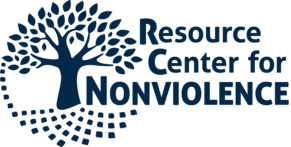SANTA CRUZ, CA — As we reflect on this year’s United Against Hate Week, it’s evident that our community’s response to hate is evolving, becoming more nuanced and far-reaching. During a pivotal conversation between Silvia Morales, Executive Director of the Resource Center for Nonviolence (RCNV), and renowned scholar and activist Dylan Rodriguez, a profound discussion unfolded, encapsulating the essence of our fight against systemic injustices and the need for a transformative approach to hate.
Rethinking Hate and Power
The dialogue, part of the “RCNV Conversations” series, was not just an intellectual exchange but a ready call to action. Rodriguez challenged us to reconsider our understanding of hate, urging us to see beyond the individual acts of prejudice and recognize the larger systems at play. “By fixating on [just] hate, we are forced to reduce forms of violence and suffering to the realm of individualized feelings,” Rodriguez emphasized. This reductionist view detracts from addressing the structural conditions that cultivate hate.
Morales resonated with Rodriguez’s insights, acknowledging the complexities of combating hate in an era where it’s often simplified as a series of individual wrongdoings rather than manifestations of broader societal failures. She highlighted the insidious nature of systemic violence, often masked as bureaucratic indifference, which perpetuates inequalities and silences the marginalized.
Election Year Context and Collective Responsibility
This year’s United Against Hate Week holds particular significance as it coincides with the ramp-up to the 2024 elections—a time when the rhetoric surrounding hate and division becomes especially charged. The discussion between Morales and Rodriguez underscored the importance of this moment, advocating for a community-wide mobilization that looks beyond electoral cycles to foster long-term societal change.
Rodriguez pointed out that real progress involves “holding our collective selves responsible for developing strategies that address far more than the animosities of individual people.” It’s about building systems that inherently resist and dismantle the breeding grounds of hate.
Call to Action: Building a Beloved Community
The week’s events, crafted around this critical dialogue, invited participants from various sectors to engage deeply with these themes. From workshops to discussions that cut through the superficial layers of social discourse, each session was designed to equip our community with tools to actively dismantle the systems that perpetuate hate.
As we move forward, the RCNV, under Morales’s leadership, commits to not just annual events but a sustained, year-round effort to integrate these insights into practical community actions. The engagement doesn’t end with United Against Hate Week; it’s merely a starting point for deeper involvement and more profound commitments to justice.
Empowering Through Solidarity
Morales’s closing remarks at the week’s final event encapsulated a powerful vision: “Together, we can redefine the landscape of activism, turning our collective gaze towards systems of power that need dismantling. Let us move from reflection to action, from individual outrage to collective solidarity.”
As we reflect on the discussions of the past week, it becomes clear that our path forward lies in unity and the relentless pursuit of an equitable society. The challenge is substantial, but so is the resilience of our community. Together, we can forge a future where hate finds no refuge, and love governs the tenets of our Beloved Community.

